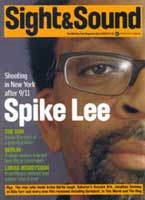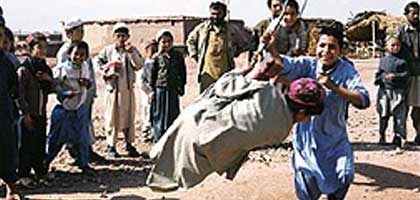
In This World
UK 2002

Reviewed by Richard Kelly
Synopsis
Our synopses give away the plot in full, including surprise twists.
February 2002. Jamal and his older cousin Enayat are Afghans living in Shamshatoo refugee camp in Peshawar, north-west Pakistan. Enayat's uncle Wakeel decides to send him to London. Jamal brokers an introduction to a 'people smuggler', and persuades Wakeel that he, as an English speaker, should accompany Enayat. They travel in the back of pick-up trucks across desert into Iran. They hole up for ten days before boarding a bus to Tehran, but a checkpoint official removes them and they are escorted back into Pakistan. They reach Tehran by an illicit route and, concealed in a fruit truck, are driven towards the mountainous border. On foot they cross a snowy Kurdish-controlled pass and enter Turkey.
At Istanbul they and other refugees are locked in a freight container on a ship bound for Italy. En route most suffocate and die, including Enayat, but Jamal survives. In Trieste he steals to procure a train ticket to Paris, and reaches Sangatte refugee centre. He is befriended by Yusif, and at Calais the two stow away under a lorry bound for England. In London Jamal phones Wakeel to tell him that Enayat is not "in this world". Captions state that Jamal was refused asylum but granted exceptional leave to stay in Britain until his eighteenth birthday.
Review
Digital video is the greatest boon yet for film-makers wishing to speak immediately of their times. So it is that from the midst of a furious global debate about human traffic and economic migration comes Michael Winterbottom's running-and-gunning testimony to the trials that face Afghan refugees. News media have made us familiar with the sorry bolt-holes of Shamshatoo in north-west Pakistan and Sangatte in northern France; Winterbottom's small camera traverses the distance between the two, and makes these infamous sites part of a vivid screen story.
Winterbottom professes to dislike the term 'docu-drama' but it is indisputably just such a hybrid that he has made here. Tony Grisoni's script was evidently a provisional bible of ideas for story and character. Winterbottom found an appealing pair of non-professionals, Jamal Udin Torabi and Enayatullah, to enact a trek from Peshawar to Kilburn (though the two are little more than ciphers: the journey itself, with all its terrible exigencies, is the star). Production was then an organisational triumph, with producer Anita Overland travelling ahead of the crew to clear a path. DoP Marcel Zyskind shot with available light, and the digital cut has transferred luminously to widescreen 35mm. The result is an attempt to realise the epic form by sparse means. That said, there is some significant stylisation: a sombre, politicised voiceover, a surging score by Dario Marianelli, plus a CGI map that charts the pair's progress.
Winterbottom doesn't dally in Peshawar: we get a sniff of teeming life there (some rapturous dancing, the bloody slaughter of a bull), but the cutting is crisp, the film keen to be on its way. It soon acquires a rhythm, of cramped journeys in ramshackle vehicles through inhospitable terrain, followed by stopovers in small rooms and negotiations with handlers for the next leg of the journey. Winterbottom induces in us a small measure of dread that the two youths will be fleeced, but then money is seen effectively to grease every palm (Enayat even produces a roll of dollars from his shoe at one fraught moment). Gradually we understand that the passage will indeed be enabled; that the passage, indeed, will be the problem.
Danger accumulates. There is a chilling sequence where the pair are guided by Kurdish villagers over snowbound mountains so as to circumvent a guarded pass into Turkey. Winterbottom shoots with a blurry night-sight, the wind howls, gunfire below is seen and heard. Even the indomitable Jamal briefly falters, but finally they push on, to Istanbul. The nightmare that awaits them is the freight container in which they are entombed for a 40-hour ferry journey to Trieste. The horror of the refugees in darkness screaming and banging hopelessly on locked metal doors clearly commemorates the real-life tragedy of the 58 Chinese found dead in similar circumstances at Dover in 2000. This is the film's dramatic zenith, but the journey is not complete: Jamal, and Winterbottom, boldly push on to the Red Cross 'reception centre' at Sangatte. This brief evocation of the since demolished camp is fascinating: a tented indoor village of refugees, killing time with cigarettes, cards and football in between their dogged efforts to cross the English Channel by any locomotive means.
Finally Winterbottom cuts between Jamal mumbling prayers in a London mosque and sentimental shots of kids clocking his camera back in Shamshatoo. By now this 88-minute film has raised more questions than it intends to answer. Are we to understand these Afghans as perennial war victims, bedevilled first by the Soviets, then by the Americans? Or as aspiring economic migrants, desirous of a better ticket in the global lottery? The early voiceover refers flatly to the "US bombing" of Afghanistan in October 2001, from which an alien might assume that the United States made war on the Taliban out of spite. And the film doesn't articulate why the UK is so much the desired destination that Jamal keeps driving onward through his dreadful suffering, rather than simply lodging his asylum claim in Italy or France.
At the outset, the Peshawar bondsman who takes receipt of Uncle Wakeel's stake tuts and tells the travellers, "You're better off in your own country." So hardy do Jamal and Enayat prove en route that we sense they appreciated some of the hell they would endure. Still, the moral one takes away is, 'Stay at home.' Few feature film-makers risk so much as has Winterbottom here, and his film is a marvel in many ways. Unfortunately it is no more informative, possibly even less involving, than umpteen pieces of print and television reportage that have set out similarly to chronicle one of the major humanitarian crises of our age.
Credits
- Director
- Michael Winterbottom
- Producers
- Andrew Eaton
- Anita Overland
- Screenplay
- Tony Grisoni
- Director of Photography
- Marcel Zyskind
- Editor
- Peter Christelis
- Music/Music Conductor
- Dario Marianelli
